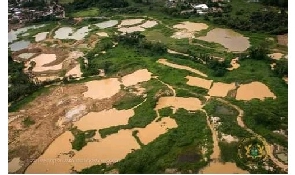The Water Resources Commission is calling for an attitudinal change to help boost the availability of treated water for both domestic and commercial use especially in the northern parts of the country.
According to the commission, human activities such as sand winning, rampant felling of trees and pollution is affecting the constant supply of water to citizens, reversing the gains of the commission in the provision of portable water for Ghanaians.
Speaking to Koku Lumor on the Class Morning Show on Class91.3FM on Wednesday, 22 March 2023, Director of Planning at the Water Resources Commission, Dr Bob Alfa, said the commission has taken steps through its integrated water resources management programme to educate the citizenry on how to keep and maintain water bodies for constant flow of water for their needs.
Explaining the consequences of polluting water bodies, he said “We pollute water by undertaking sand winning and, therefore, even if the water is there it is not treatable. If you abstract 10 gallons of water not polluted, you can get eight gallons as treated water but if the water is heavily polluted, you can get four gallons as treated water so that is a reduction in the availability of water. So we must engage the people to change their attitudes.”
Touching on the integrated water resources management, Dr Alfa noted that “the goal of that plan is to ensure that everybody has access to water. That plan is not for only urban or rural areas; the goal is to ensure everybody has water. How do we ensure that, it depends on changing the attitudes of the people while we also put measures in place because it doesn’t matter what you do, if you don’t change the attitudes of the people, you’ll reverse the gains that you’ll make so you look at it in a double approach”.
As part of its water resource management, Dr Alfa said the commission has embarked on tree planting exercises in the north because water is related directly to climate.
“If you change the climate, then you have access to water. To reduce the amount of water that is evaporated [we’re planting trees]”.
He further noted that the commission is “doing a lot of education in secondary schools, primary schools and this is to instill sustainable behaviours in terms of water resources in the people.”
He added “The sand winning is something that requires enforcement and that has been lacking a bit because even in the south western part of Ghana, we have illegal mining that we’ve not been able to stop so…it is our job to make sure everybody gets water. We also invest in studies to know if we can have ground water, so a lot of drilling is going on so that communities can rely on ground water.”
While doing this he stressed once again that “if we do not change our behaviours and accelerate change, we will reverse the gains”.
General News of Thursday, 23 March 2023
Source: classfmonline.com













